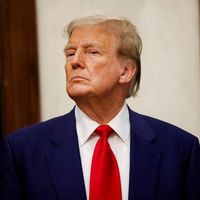UN Nuclear Watchdog Says Iran’s 2015 Deal ‘Means Nothing’
The head of the UN's nuclear watchdog says Iran’s 2015 nuclear agreement to limit its nuclear program "exists only on paper and means nothing."
In an interview with Russian newspaper Izvestia, the International Atomic Energy Agency Director General Rafael Grossi said: “Nobody applies it, nobody follows it. There have been attempts to revive it here in Vienna. But unfortunately, although they were relatively close to success, they failed for reasons unknown to me, because I was not involved in the process.”
The statement comes just weeks after Grossi admitted the agency "has lost continuity of knowledge in relation to the production centrifuges, rotors and bellows, heavy water, and uranium.” He recently also admitted that Iran is “weeks not months” away from a nuclear weapon, with enrichment reaching alarming levels.
He said “the parties mutually blame each other for the failure - mainly the United States and Iran”, referencing the breakdown in progress since the US withdrew from the nuclear agreement under former President Donald Trump.
“ I continue to tell my Iranian colleagues that we must provide the agency with at least minimal access to help return to the second version of the JCPOA or any other agreement,” he stressed, but noted it is not an easy road to deal with Tehran.
“There are problems, I’ll be honest with you. We do cooperate with Iran. I don't deny this. This is important for inspection. My Iranian colleagues often say that Iran is the most inspected country in the world. Well, it is, and for good reason. But this is not enough,” he warned.
On Saturday, France, Germany, and Britain, original signatories of the 2015 nuclear deal with Iran, condemned Tehran’s latest actions to further expand its uranium enrichment.
"Iran has taken further steps in hollowing out the JCPOA, by operating dozens of additional advanced centrifuges at the Natanz enrichment site as well as announcing it will install thousands more centrifuges at both its Fordow and Natanz sites," the joint statement said.
During the interview with Izvestia, Grossi also highlighted the importance of Russia's collaboration with Iran, as Moscow "can influence compliance with a peaceful nuclear order”, the two nations firm allies in the field of military cooperation. Iran has been providing Russia with drones for its war on Ukraine, with manufacturing facilities for Russia being built with Iranian assistance.
“I think this is our shared responsibility. And Russia plays a very important role in this diplomacy, trying to keep the Iranian program within a predictable and peaceful framework,” he noted, reiterating that “if we cannot verify everything, we cannot give the guarantees that the international community expects from us.”
Grossi added that since signing the agreement in 2015, Iran’s program “has expanded significantly”. He said: “They are capable of producing the latest generation centrifuges, building new facilities and much more.”
Iran’s nuclear chief insists the country is adhering to the Nuclear Non-Proliferation Treaty (NPT) agreements, but is “in the process of reducing its nuclear obligations from the 2015 agreement." Mohammad Eslami maintained Tehran is still following the NPT Safeguards Agreement and is only reducing the obligations it had under the 2015 nuclear deal, known as the Joint Comprehensive Plan of Action (JCPOA).
Iran has responded to an IAEA Board of Governors’ censure resolution, passed in early June, by expanding its uranium enrichment capacity at two underground sites.Iran has rapidly installed two more cascades, or clusters, of uranium-enriching centrifuges at its Fordow site and begun work on more while also planning others at its underground plant at Natanz, a UN nuclear watchdog report said.
"On 9 and 10 June ... Iran informed the Agency that eight cascades each containing 174 IR-6 centrifuges would be installed over the next 3-4 weeks in Unit 1 of FFEP (Fordow Fuel Enrichment Plant)," the confidential International Atomic Energy Agency report sent to member states on Thursday said.
"On 11 June 2024, the Agency verified at FFEP that Iran had completed the installation of IR-6 centrifuges in two cascades in Unit 1. Installation of IR-6 centrifuges in four additional cascades was ongoing," the report said, referring to one of one of Iran's most advanced centrifuge models.
While non-binding, resolutions by the International Atomic Energy Agency's 35-nation Board of Governors anger Tehran, which typically responds by accelerating its nuclear activities.
Admitting that Iran's uranium enrichment continues to intensify, Grossi said, "We know that Iran is considering a number of activities which require construction of new facilities, installing new cascades, among other things". In the Monday press conference, Grossi stressed the severity of the situation as the program continues unabated. "They should be informing us of these changes," he said.
Grossi pointed out that it has been over three years since Iran ceased applying its Additional Protocol, restricting the IAEA’s ability to perform comprehensive inspections. "There has been no progress in resolving the outstanding safeguards issues," he stated, mentioning unresolved queries regarding traces of uranium found at undeclared sites in Varamin and Turquzabad.
On Saturday, ahead of the International Atomic Energy Agency (IAEA) Board of Governors meeting, Iran issued a warning regarding a possible censure resolution. Ali Shamkhani, a senior aide to Iran's Supreme Leader and reported head of Iran's nuclear negotiations, declared that Iran would deliver a "serious and effective response" if European countries advanced a resolution criticizing its nuclear program.







